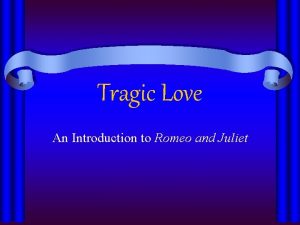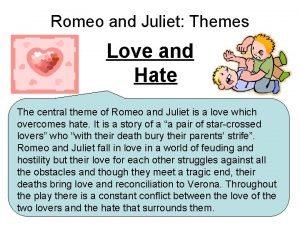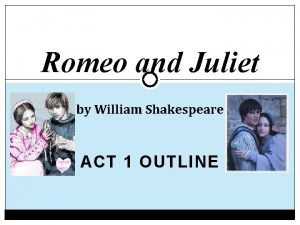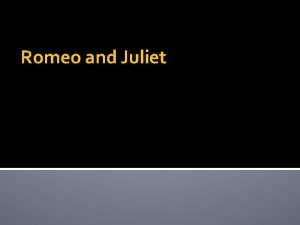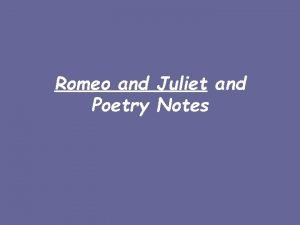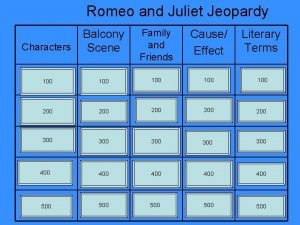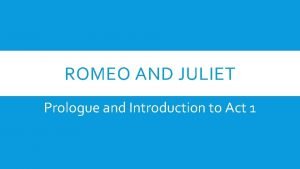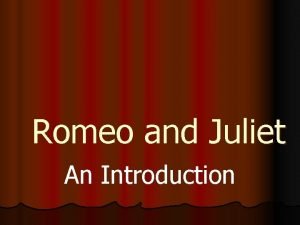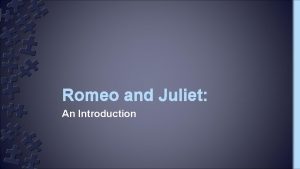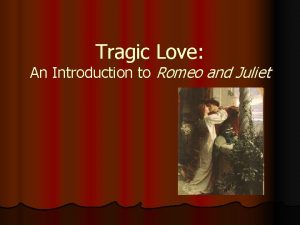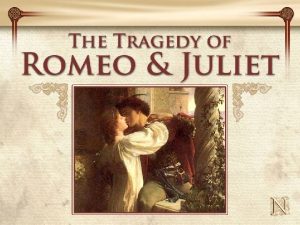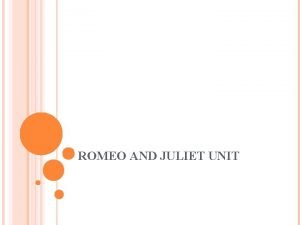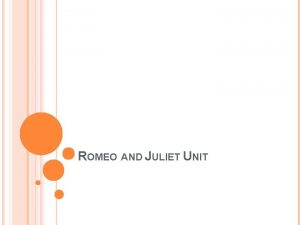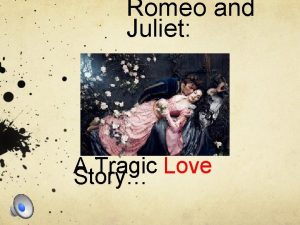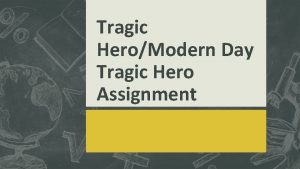Tragic Love An Introduction to Romeo and Juliet

















- Slides: 17

Tragic Love An Introduction to Romeo and Juliet by William Shakespeare

Romeo and Juliet Setting Verona, Italy • Late 1500 s •

Characters: The Capulets l l l Juliet Capulet – a lovely girl of almost fourteen Lord and Lady Capulet – her noble parents who are in a bitter feud with the Montagues Count Paris – The man Juliet’s parents want her to marry Tybalt – her hot-tempered cousin Nurse – the woman who has cared for Juliet since she was born

Characters: The Montagues l l l Romeo Montague – the romantic son of the Montagues who falls in love with Juliet at first sight Lord and Lady Montague – Romeo’s noble parents who feud with the Capulets Benvolio Montague – Romeo’s cousin, a peacemaker Mercutio – friend of Romeo, humorous, a card Friar Laurence – An influential Franciscan priest

Shakespeare Wrote Plays That Were Comedies and Tragedies Romeo and Juliet is a tragedy.

Examples of tragedy:

Thinking about Tragedy What tragedies have taken place in human history? What television shows, movies, or books show tragedy? How does tragedy affect people’s lives?

Tragic Love l Romeo and Juliet is considered a tragic love story. l What l How is tragic love? does tragic love affect teenagers today?

What is a Tragedy? l. A narrative about serious and important actions that end unhappily. Usually a tragedy ends with the deaths of the main characters. In some, the disaster this totally innocent characters; in others the main characters are in some ways responsible for their downfall.

Shakespeare’s Tragic Plays Usually Follow This Five-Part Pattern Act I – Act II – Act V – . Act IV –

Shakespeare’s Tragic Plays Usually Follow This Five-Part Pattern (Gosh, doesn’t this look like something you’d need to know for a test? !? !) Act I – Exposition Introduces setting, characters, background, and conflict. Act II – Rising Action Complications arise as characters take action to resolve problems. Act III – Crisis/Turning Point The forces of conflict come together and the characrers determine the direction of the action. Act V – Climax and Resolution The climax is usually the deaths of the main characters. The loose parts of the plot are tied up in the resolution. Act IV – Falling Action Events that result from actions taken at turning point. Lock characters deeper into disaster and into tragedy.

Romeo and Juliet: Summary l. A family feud l Falling l. A in love secret marriage

Romeo and Juliet: Summary l. A fight l. A banishment l. A match-making father

Romeo and Juliet: Summary l A desperate plan l Some deadly gossip l The death of Romeo and Juliet l A lesson learned

Romeo and Juliet Today do we read Romeo and Juliet today? l Why l How does the story connect to the lives of teenagers today? Think locally, think globally.

Literary Terms We’ll Study (in addition to reviewing those we’ve already learned) Dramatic Irony Soliloquy Foil Iambic pentameter Allusion Tragedy Foreshadowing Blank verse Aside Couplet Comic relief Stanzas Puns Prologue Implied Metaphors Meter Sonnet Climax Rhyme and rhyme scheme Drama

Homework Your homework tonight is to use the Handbook of Literary Terms beginning on page 967 in the back of your textbook to write the definitions for all 20 of the literary terms on the previous slide. I have a handout. Aren’t I nice? It is due ______. All of these terms will appear in some form on your final test.
 Tragic love an introduction to romeo and juliet notes
Tragic love an introduction to romeo and juliet notes Introduction to romeo and juliet
Introduction to romeo and juliet Juliet o romeo monologue
Juliet o romeo monologue Monologue
Monologue What is the theme of romeo and juliet
What is the theme of romeo and juliet Romeo and juliet important quotes act 2
Romeo and juliet important quotes act 2 Courtly love in romeo and juliet
Courtly love in romeo and juliet Character traits of lord montague
Character traits of lord montague Oh romeo my romeo
Oh romeo my romeo Love love jesus is love god greatest gift lyrics
Love love jesus is love god greatest gift lyrics Tybalt act 1
Tybalt act 1 Diction in romeo and juliet
Diction in romeo and juliet Date romeo and juliet was written
Date romeo and juliet was written O romeo romeo wherefore art thou romeo meaning
O romeo romeo wherefore art thou romeo meaning That dreamers often lie literary device
That dreamers often lie literary device Hook line for romeo and juliet
Hook line for romeo and juliet Prologue romeo and juliet analysis
Prologue romeo and juliet analysis Setting of romeo and juliet
Setting of romeo and juliet
